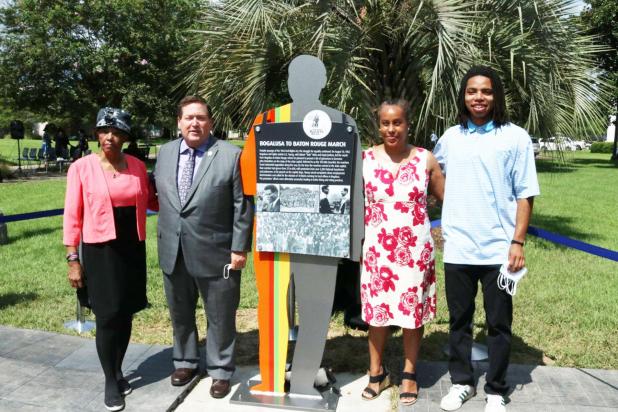
Submitted Photo
Lt. Gov. Billy Nungesser stands with family members of A.Z. Young on Monday during the unveiling of the 1967 Bogalusa to Baton Rouge marker on the Louisiana Civil Rights Trail.
Marker pays tribute to Bogalusa to Baton Rouge civil rights march
Lt. Gov. Billy Nungesser and the Louisiana Office of Tourism on Mondayu dedicated the fourth marker along the Louisiana Civil Rights Trail.
This marker, located at A.Z. Young Park in Baton Rouge, honors the first, and longest march at 105 miles, in the Civil Rights Movement.
The Bogalusa to Baton Rouge Civil Rights March started 54 years ago, on Aug. 10, 1967. Led by Civil Rights Activist A.Z. Young, with Robert “Bob” Hicks and Gayle Jenkins, the Bogalusa to Baton Rouge March was referred to as the “105-mile gauntlet.”
While facing substantial opposition requiring protection from National Guardsmen and police, the march grew from 25 to 600 people during the journey. On Aug. 20, 1967, during a rally on the steps of the State Capitol, Young presented a list of grievances to Gov. John McKeithen regarding employment discrimination and the election of 10 African Americans running for local offices in Bogalusa.
“I’m honored to dedicate this marker on the anniversary of the march,” said Nungesser. “It took courage and determination to make it from Bogalusa to Baton Rouge and we are proud to recognize this historic event on the Louisiana Civil Rights Trail as we share with visitors the impacts that our residents had on a national level in the Civil Rights Movement.”
The Louisiana Civil Rights Trail brings together the events of the 1950s and 1960s that placed the state of Louisiana at the center of the national civil rights movement and narrates the compelling stories and experiences of the people who dedicated themselves and their lives to making civil rights real in Louisiana.
Nungesser unveiled the first three markers on the trail this past spring in New Orleans, Baton Rouge, and Shreveport. The Louisiana Civil Rights Trail will play a vital role in telling Louisiana’s story to residents and visitors alike.
The Louisiana Office of Tourism is requesting $50,000 from the National Park Service’s African American Civil Rights Grant Program to assist in the fabrication and installation of 12 interpretive markers at significant sites in Louisiana on the Louisiana Civil Rights Trail. A total of 16 Louisiana Civil Rights Trail interpretive markers will be fabricated and installed to tell the stories and demonstrate the power of the people – young, old, black, white in Louisiana during the Modern Civil Rights Movement to “Make Rights Real.” The overarching goal is to create a cultural tourism experience that invites visitors to explore sites and learn more about the events significant to the Civil Rights Movement in the 1950s and 1960s.
The interpretive markers are a dynamic alternative to traditional historical markers used around the country, reflecting the uniqueness of the Louisiana Civil Rights Trail. The interpretive markers are in human silhouettes, seven-feet-tall, with photos and text depicting the people and activities that helped to shaped history. In honor of the participants, the signage for the physical sites is designed to provide travelers of the trail with a compelling, interactive (selfie-ready) experience making them feel like they are a part of the journey of Making Rights Real. Photos of the interpretive maker design are included as attachments.
The Louisiana Civil Rights markers unveiled to date include:
—Bogalusa to Baton Rouge March .
—The Baton Rouge Bus Boycott was a historic effort by black residents seeking fair treatment by the local bus company.
—Little Union Baptist Church was the epicenter of civil rights activities in Shreveport. Through the dynamic leadership of Reverend Claude Clifford McClain, members of the congregation strategized resolve civil rights issues peacefully, planned store boycotts to protest hiring practices by downtown stores, and conducted voter registration drives. Dr. Martin Luther King Jr. made his last public appearance delivering an inspirational speech from the church pulpit.
—Dooky Chase’s Restaurant in New Orleans gained notoriety as a place where people of all races could sit down and discuss strategies for the civil rights movement.
